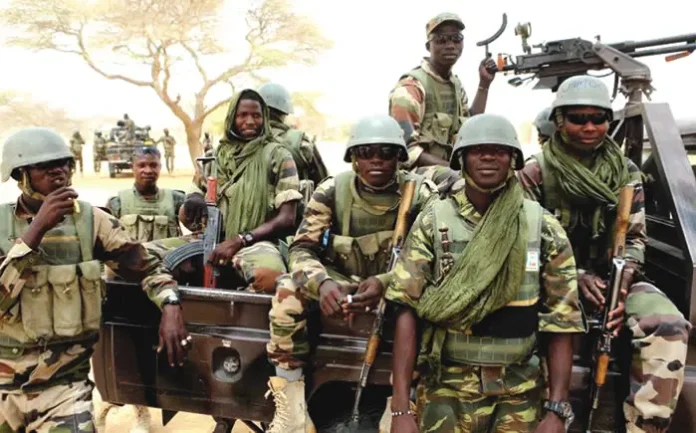The Nigerian Defence Headquarters disclosed on Friday that military operations conducted under President Bola Tinubu’s administration have yielded substantial results in combating insurgency and banditry since he took office in May 2023. According to Major General Markus Kangye, Director of Defence Media Operations, the armed forces have successfully eliminated more than 5,000 insurgents and criminal elements operating across several conflict zones in the country. These operations spanned the Northeast, Northwest, and North Central regions, representing a coordinated effort to restore peace and security to affected areas. The military leadership attributes these achievements to the President’s renewed strategic framework, which has guided operational planning and execution over the past two years.
Beyond neutralizing threats, the military has reclaimed over 350 communities and villages that were previously under the control of terrorist groups and armed bandits. These liberated settlements are primarily located in Borno, Niger, Zamfara, and Katsina States, areas that have long suffered from insurgent occupation and criminal activity. The restoration of civil authority in these regions marks a turning point in the government’s efforts to reassert territorial integrity and provide security to displaced populations. Major General Kangye emphasized that these gains reflect not only military capability but also improved coordination between security forces and local communities.
The Defence Headquarters also addressed recent allegations made by Amnesty International regarding security challenges in Plateau State. The human rights organization claimed that 2,630 people were killed by terrorists and bandits in the state over the last two years, and that 167 communities were displaced during this period. Military authorities strongly refuted these figures, describing them as fabricated and designed to misrepresent the actual security situation. According to the Defence Headquarters, the report presents an overly bleak assessment that fails to acknowledge the complex and evolving nature of contemporary security threats, many of which are rooted in longstanding socio-political and economic issues that span decades.
The military leadership clarified that Plateau State has experienced considerable improvement in security conditions following a reorganization of troop deployments and the implementation of comprehensive subsidiary operations beginning in July 2023. While acknowledging that coordinated attacks occurred in Bokkos and Bassa Local Government Areas on specific dates in April 2025, as well as during Christmas Eve 2023, officials maintained that these incidents do not support the casualty figures presented by Amnesty International. The Defence Headquarters characterized the report as a deliberate attempt to mislead the public and generate negative sentiment against the military, pursuing what they described as a self-serving agenda that undermines genuine security improvements.
In addition to combat operations, the armed forces have achieved significant success in hostage rescue missions. Working in partnership with local intelligence networks, military units have rescued more than 1,200 abducted civilians, including women and children who were kidnapped in various mass abduction incidents across the country. The establishment of Quick Response Forces and Forward Operating Bases has enhanced the military’s ability to respond rapidly to security emergencies. This improved operational posture, combined with stronger coordination between state governments and community leaders, has fostered better civil-military relations and increased public confidence in security operations.
Several major military initiatives have contributed to the suppression of militia activities and inter-communal violence. Operation Safe Haven, Operation Hadarin Daji, and Operation Whirl Stroke have all played crucial roles in degrading the operational capacity of armed groups operating in different regions. These operations have employed a combination of ground forces, air support, and intelligence-driven tactics to disrupt criminal networks and prevent violent conflicts between communities. The military leadership noted that these efforts have created a more stable environment in previously volatile areas, allowing for the gradual return of displaced persons and the resumption of economic activities.
The Nigerian Air Force has conducted over 500 successful air interdictions and close air support operations, significantly hampering the movement and logistics capabilities of armed groups. The deployment of modern surveillance drones and the conduct of night operations have provided tactical advantages that were previously unavailable to security forces. These technological enhancements have improved the precision of military strikes while minimizing civilian casualties, a concern that has often complicated counter-insurgency operations. The increased surveillance capability has also enabled better intelligence gathering, allowing forces to anticipate and preempt attacks before they occur.
Military engineering units have undertaken extensive work to secure and rehabilitate critical transportation and communication corridors that were previously vulnerable to attacks by criminal elements. This infrastructure protection has facilitated commerce and movement across regions that were once considered too dangerous for regular travel. Additionally, increased joint patrols along porous border areas with neighboring countries including Cameroon, Niger, and Chad have reduced cross-border infiltration by armed groups. These border security measures have disrupted supply lines and recruitment networks that insurgent organizations relied upon to sustain their operations.
The Defence Headquarters emphasized that while challenges remain, the progress achieved over the past two years demonstrates the effectiveness of the current security strategy. Military authorities called on Nigerians to support security forces and resist efforts by external organizations to distort the narrative of progress being made across the country. They stressed that accurate reporting and public support are essential components of the broader effort to achieve lasting peace and stability in all regions affected by insurgency and banditry.

